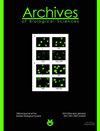Seselin promotes cisplatin-induced apoptosis of AGS gastric cancer cells by inhibiting β-catenin expression
IF 0.8
4区 生物学
Q4 BIOLOGY
引用次数: 0
Abstract
Gastric cancer is a commonly diagnosed form of cancer, and cisplatin is commonly used as a chemotherapy drug for treating it. However, the side effects of cisplatin may reduce patients? willingness to use it. Seselin, a derivative of coumarin, has been found to have anticancer properties as well as anticoagulant effects. In this study, we investigated the effect of seselin on promoting cisplatininduced gastric cancer cell death using the cell proliferation reagent WST-1, BrdU incorporation and lactate dehydrogenase release. The role of seselin and cisplatin in the apoptosis of gastric cancer cells was analyzed using a phospho-kinase array and Western blot analysis. Seselin did not affect G2/M stasis, but it promoted cell death in AGS cells treated with cisplatin. Phospho-kinase array analysis revealed that cisplatin regulates intracellular p53 phosphorylation, while seselin regulates intracellular ?-catenin expression by affecting the phosphorylation of glycogen synthase kinase-3 beta (GSK-3?), extracellular-signal-regulated kinase (ERK) and Src tyrosine kinase. Seselin and cisplatin promote the apoptosis of gastric cancer cells by the synergistic effect of two distinct signaling pathways. These findings suggest that seselin may be used as a complementary therapy to reduce the clinical dose of chemotherapy.Seselin通过抑制β-catenin的表达促进顺铂诱导的AGS胃癌细胞凋亡
胃癌是一种常见的癌症,顺铂通常被用作治疗胃癌的化疗药物。然而,顺铂的副作用可能会减少患者?愿意使用它。芝麻素是香豆素的衍生物,已被发现具有抗癌特性和抗凝血作用。本研究通过细胞增殖试剂WST-1、BrdU的结合和乳酸脱氢酶的释放,研究了seselin促进顺铂诱导的胃癌细胞死亡的作用。采用磷酸激酶阵列和Western blot分析seselin和顺铂在胃癌细胞凋亡中的作用。Seselin不影响G2/M停滞,但促进顺铂治疗AGS细胞的细胞死亡。磷酸化激酶阵列分析显示,顺铂调控细胞内p53磷酸化,而seselin通过影响糖原合成酶激酶3 β (GSK-3 β)、细胞外信号调节激酶(ERK)和Src酪氨酸激酶的磷酸化调控细胞内-catenin的表达。Seselin和顺铂通过两种不同的信号通路协同作用促进胃癌细胞凋亡。这些发现表明,seselin可以作为一种辅助疗法,以减少化疗的临床剂量。
本文章由计算机程序翻译,如有差异,请以英文原文为准。
求助全文
约1分钟内获得全文
求助全文
来源期刊
CiteScore
1.40
自引率
0.00%
发文量
25
审稿时长
3-8 weeks
期刊介绍:
The Archives of Biological Sciences is a multidisciplinary journal that covers original research in a wide range of subjects in life science, including biology, ecology, human biology and biomedical research.
The Archives of Biological Sciences features articles in genetics, botany and zoology (including higher and lower terrestrial and aquatic plants and animals, prokaryote biology, algology, mycology, entomology, etc.); biological systematics; evolution; biochemistry, molecular and cell biology, including all aspects of normal cell functioning, from embryonic to differentiated tissues and in different pathological states; physiology, including chronobiology, thermal biology, cryobiology; radiobiology; neurobiology; immunology, including human immunology; human biology, including the biological basis of specific human pathologies and disease management.

 求助内容:
求助内容: 应助结果提醒方式:
应助结果提醒方式:


